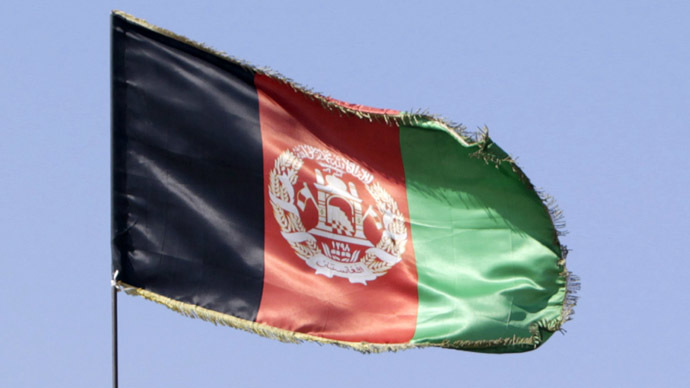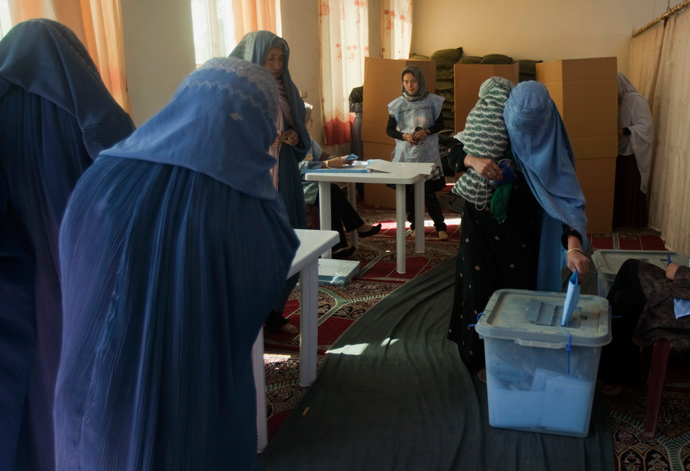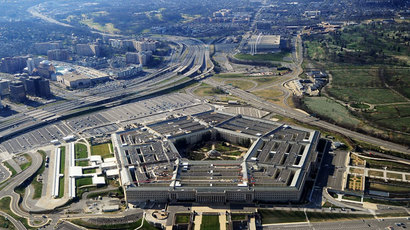‘More Afghanis are going to turn to the Taliban, seeking safety’

Notorious Afghan warlords, tribal chiefs, current power players, and technocrats: over 20 candidates have registered for next April’s presidential vote. RT spoke with experts to discuss how the NATO troop withdrawal will affect the poll.
Some 27 people, including the Afghan president's brother, have filed papers announcing their intention to run for presidency by Sunday evening, the final day for the registration.
Election authorities are expected to announce a preliminary list of candidates on October 19, while the final list of contenders seeking to replace Hamid Karzai, following his 12 years in power, will be published on November 16, according to Pajhwok Afghan News.
The concoction of candidates is marring optimism for the prospect of the first democratic transfer of power in Afghanistan's history. Incumbent President Karzai is out of the game due to term limits. Speaking on Monday, he called on foreigners not to interfere in the electoral process “and avoid repeating the bitter experience of previous presidential and parliamentary polls.”
Meanwhile, radical Islamic movements, such as the Taliban, are now seeking their way back into the government. The Taliban have already dismissed the 2014 April 5 presidential vote as “a waste of time” and threatened to disrupt the electoral process.
“They consider democracy a Western religion,” Afghanistan expert Jere Van Dyk, who was kidnapped and held captive by the Taliban, told RT. The movement wants Islam, “the submission to God, and the rule of God,” while “the rule of man is anathema to them,” he added. “They are diametrically opposed to this.”

Afghan presidential candidate, Daoud Sultanzoy, believes the biggest threat for the country is not the Taliban or “armed resistance”, but “the gap between the government and the people.” In his view, the Taliban only looks strong because of the weakness of the current “corrupt” leadership. If it was not for that, “they would have no grounds to do what they are doing now,” Sultanzoy told RT.
At the same, if the movement “really” wants the Americans to leave Afghanistan, it should “allow candidates who are not tainted, who speak on behalf of the people, to come and replace this corrupt government, so we can pave the way to the American withdrawal.”
It is likely that after the US-led troop withdrawal, favor might reside with the Taliban, because they have control of large parts of Afghan, according to journalist Assed Baig.
There has been an increase in attacks by the Taliban militants lately, but, at the same time, there have been a number of defections to the group, including by the police and the military, he told RT. Just last month, Qazi Abdul Hai, a former Afghan senator and governor in the northern province of Sar-e-Pul, joined the Taliban.
The reason behind such a trend is that people want security, which they currently do not have, Baig said.
“The government doesn’t have much credibility outside the major cities, so the people are already looking at the Taliban as a source of stability. Not that they agree with their ideology or the methodology. But they want to feel safe and don’t want to be stopped and searched by foreign troops or anyone insulting their culture. So I think we will to see more people looking towards the Taliban because that’s the only option they really have,” the journalist said.
The US policy of not engaging and not holding talks with the movement has “backfired,” Baig said. Only now Americans are coming to realize that they actually have to “talk with these people and maybe even accept the fact that once they leave, the Taliban will have large influence in the government”.
Peace in Afghanistan cannot be reached without talking to the Taliban, and also to Pakistan, the journalist thinks and the US will have to engage with these two players if it wants stability in the region.
As candidates for the 2014 presidential poll were filing their applications, a bomb killed four US soldiers in southern Afghanistan on Sunday. These latest casualties of the 12-year conflict have brought this year’s death toll among foreign forces to 132, of which 102 are Americans.














